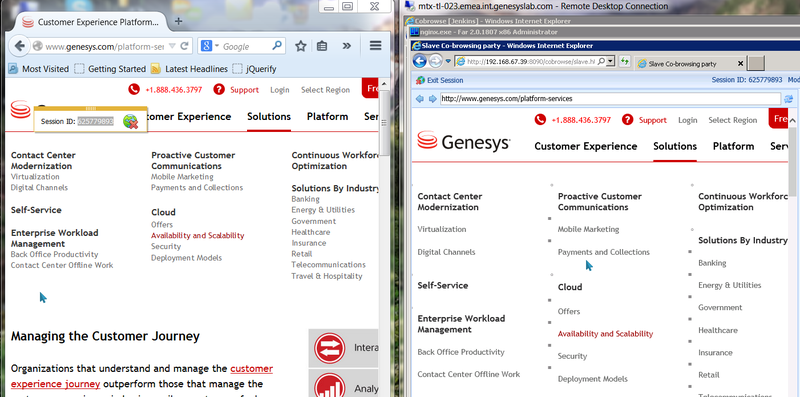Co-browse Restrictions and Known Limitations
Contents
- 1 Co-browse Restrictions and Known Limitations
- 1.1 Co-browse No Longer Supports Interaction Workspace 8.1
- 1.2 Co-browse Must Be Deployed on the Same Second-level Domain as the Website
- 1.3 Synchronization of Interactions with Browser Plugins is Not Supported
- 1.4 Some Obsolete Web Techniques are Not Supported
- 1.5 Some HTML5 Features are Not Supported
- 1.6 Some Pseudo CSS Selectors are Not Supported
- 1.7 Synchronization of Scrolling Position for HTML Elements is Not Supported
- 1.8 Customer Representative Can Handle Only One Co-browse Session at a Time
- 1.9 Conferencing, consultation and transfer are not supported for Co-browse sessions
- 1.10 Representation of Dynamically Shown List Items May be Partially Broken on Agent Browsers Using IE10 or IE11
- 1.11 IE Conditional Comments
- 1.12 Scaling effects are not supported
- 1.13 Different co-browse sessions in the same browser instance are not supported for the user
Co-browse No Longer Supports Interaction Workspace 8.1
Starting with release 8.5.0, Interaction Workspace 8.1.x is no longer supported by Genesys Co-browse.
Co-browse Must Be Deployed on the Same Second-level Domain as the Website
Due to some browsers' strict cookie policies, Genesys highly recommends that you host the Load Balancer on the same domain as the website or on one of its sub-domains. Otherwise, chat and Co-browse stickiness cookies may be rejected as third-party and the solution will not work. Users will not be able to start chat nor begin co-browsing.
Synchronization of Interactions with Browser Plugins is Not Supported
By design, synchronization of interactions with browser plugins is not supported. HTML markup managed by browser plugins (Flash, Java, Silverlight, ActiveX, etc.) is synchronized as is and may be displayed if both browsers support the plugin.
Some Obsolete Web Techniques are Not Supported
- Quirks Mode, Almost Standards Mode — Co-browse always uses Full Standards Mode when rendering the customer's website on the agent side and requires the valid document type definition to be set on the customer's pages. Technically, it means that doctype is always set to <!DOCTYPE html> when rendering anything on the agent side. Pages in Quirks Mode or Almost Standards Mode are not supported.
- Framesets — Obsolete technology is not supported.
Some HTML5 Features are Not Supported
The following HTML5 features are not supported:
- Canvas
- WebGL
- SVG
- HTML5 audio and video—HTML markup is synchronized. Synchronization of playing, pausing, etc. is not supported.
Some Pseudo CSS Selectors are Not Supported
The following pseudo selectors are not supported:
- :visited
- :target
- :active
- :focus
- :fullscreen
- :scope
- CSS3 form selectors such as :valid and :required
For other pseudo selectors (For example, :dir(), :read-only, and :nth-last-of-type()), synchronization depends on the browsers. The pseudo-selector will be synchronized only if it is supported by both browsers.
Synchronization of Scrolling Position for HTML Elements is Not Supported
Customer Representative Can Handle Only One Co-browse Session at a Time
Starting with Co-browse 8.5.003, an agent is by default limited to handling one co-browse session at a time. You can allow an agent to handle more than one co-browse session at a time by configuring co-browse session limitations in Workspace Desktop Edition.
Conferencing, consultation and transfer are not supported for Co-browse sessions
As Co-browse sessions are not interactions like chat or voice, these standard operations for interactions are not currently supported for Co-browse.
Representation of Dynamically Shown List Items May be Partially Broken on Agent Browsers Using IE10 or IE11
Issues may arise when IE10/11 is used as a agent browser on a website with dynamically shown/hidden sub-menus.
Example:
Workaround
- Create a CSS file with a rule that sets the fixed display property of submenu list items.
Example:.my-submenu li { display: block !important; } - Host this file somwhere that is accessible via HTTP
- Specify the URL of the file in the slave.cssPatchUrl option in Config Server.
IE Conditional Comments
IE Conditional comments are used to create CSS targeting specific versions of IE or any version of IE. This technique works on IE versions 9 and below. We recommend that you avoid IE conditional comments. This technique is deprecated and support has been dropped by Microsoft since IE10.
Example:
<!--[if IE]>
<link href="ie.css" rel="stylesheet" />
<![endif]-->
<!--[if !IE]> -->
<link href="non-ie.css" rel="stylesheet" />
<!-- <![endif]-->If your website is using this technique, we strongly advise that the agent's machine uses IE10 or above for the Co-browse agent. In this case, CSS synchronization issues are possible if the site visitor (customer user) uses IE9.
Scaling effects are not supported
If an end-user or an agent are scaling their browser, the scaling effect will not be transferred to the other side, however, the size of shared page area remains the same for both sides.
Different co-browse sessions in the same browser instance are not supported for the user
Co-browse does not support two different sessions in the same browser instance at the same time for the user.

